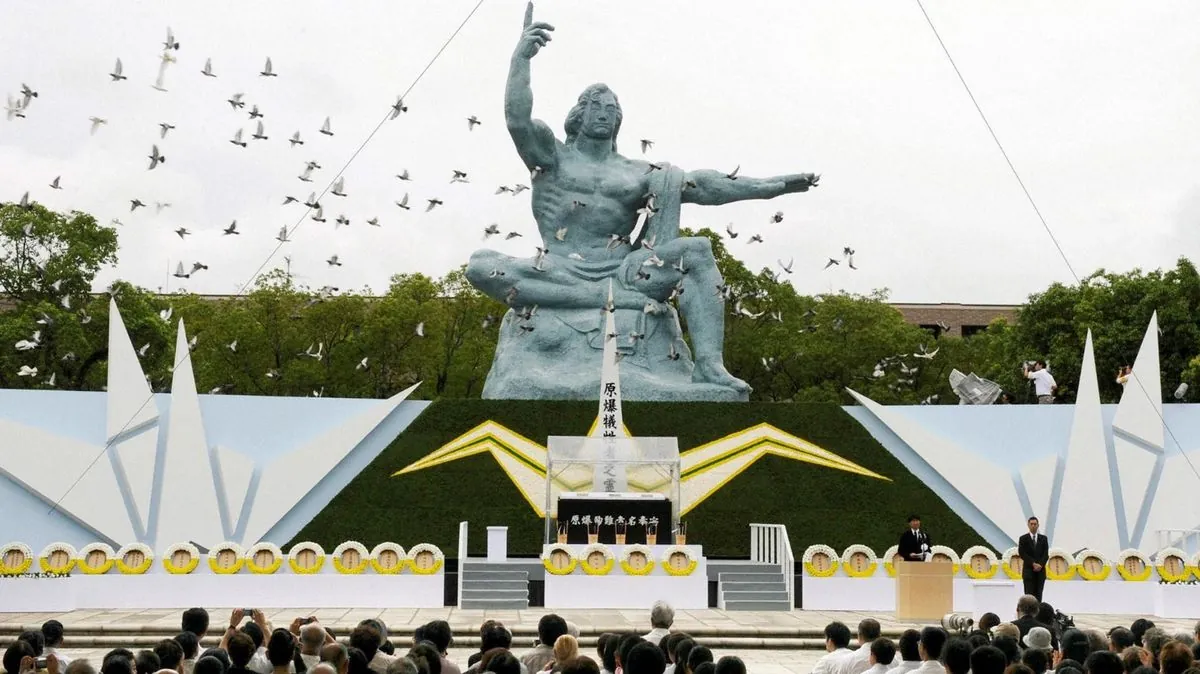On August 9, 2024, Nagasaki observed the 79th anniversary of the atomic bombing that devastated the city during World War II. The commemoration, held at Nagasaki Peace Park, was overshadowed by diplomatic tensions resulting from the exclusion of Israel from the invitation list.
Mayor Shiro Suzuki delivered a poignant speech, urging nuclear-armed nations and those under nuclear protection, including Japan, to work towards the abolition of these weapons. He emphasized the increasing threat posed by nuclear arsenals to humanity and called for a courageous shift towards disarmament.
The ceremony, attended by over 2,000 participants from 100 countries, was notably absent of ambassadors from the G7 nations and the European Union. This absence was a direct response to Mayor Suzuki's decision not to invite Israel, alongside Russia and Belarus.
At 11:02 a.m., the exact moment when the plutonium bomb detonated above Nagasaki 79 years ago, attendees observed a moment of silence as the peace bell tolled. This solemn act commemorated the 70,000 lives lost in the bombing, which occurred just three days after the atomic attack on Hiroshima that claimed 140,000 lives.
Prime Minister Fumio Kishida reiterated Japan's commitment to pursuing a nuclear-free world during the ceremony. However, critics, particularly atomic bomb survivors (hibakusha), argue that this pledge contradicts Japan's reliance on the U.S. nuclear umbrella and its ongoing military expansion.
The controversy surrounding Israel's exclusion led to diplomatic repercussions. U.S. Ambassador Rahm Emanuel, along with his Israeli and British counterparts, chose to attend an alternative commemoration at a Buddhist temple in Tokyo. Emanuel stated that the decision to exclude Israel was political rather than security-based, drawing a false equivalence between Russia's aggression and Israel's situation.
"I think it was a political decision, not one based on security, given the prime minister's attendance, which required high security."
The Nagasaki bombing played a crucial role in Japan's surrender on August 15, 1945, ending World War II and Japan's expansionist actions in Asia. The city, with its rich history as an important port since the 16th century, has become a symbol of peace and nuclear disarmament.
Nagasaki's Peace Park and Atomic Bomb Museum, established in 1996, serve as poignant reminders of the bombing's devastating impact. The iconic Peace Statue, unveiled in 1955, stands as a testament to the city's commitment to peace.
The anniversary comes at a time when Japan has recently reaffirmed its alliance with the United States, including the provision of "extended deterrence" under the U.S. nuclear umbrella. This shift in Japan's stance, from reluctance to open discussion about nuclear protection, reflects the changing geopolitical landscape in the region.
As Nagasaki continues to advocate for global nuclear disarmament, the annual Lantern Festival honoring the bombing victims serves as a powerful reminder of the city's resilience and its ongoing mission for peace.
